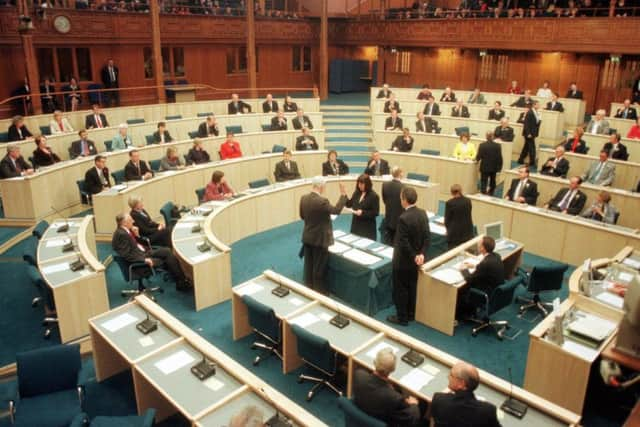Nicola Sturgeon: Why the Scottish Parliament can inspire the world
My recollections of the start of the devolution era in Scotland are vivid – for both personal and wider political and historic reasons.
Personally, it was an election which saw me elected to parliament for the first time, with the profound sense of responsibility and privilege that comes with that.
Advertisement
Hide AdAdvertisement
Hide AdAnd for the country as a whole, it was momentous – a historic event in the purest sense of the word; a moment in time which now, two decades on, seems both poignant and uplifting because of the sense of possibility that having a new parliament awakened.


It was only a new legislature in one sense, of course, as the first MSP to chair proceedings was quick to remind the 129 newly elected members as we took our seats in the Kirk’s Assembly buildings on the Mound.
Winnie Ewing’s words that “The Scottish Parliament, adjourned on the 25th day of March in the year 1707, is hereby reconvened” have become etched into the Holyrood story.
It was an important reminder that, while this 1999 institution was a new one, we were merely picking up a baton which had been laid down almost three centuries earlier.
And, for all the teething troubles of the early days, principally the controversy over the Holyrood building itself, the Scottish Parliament has been a success story.
Surveys, including some of the most detailed opinion polling, show that people across Scotland overwhelmingly identify with the Scottish Parliament, ahead of Westminster, and believe it has improved things for the better on a range of policy fronts.
Having a parliament has brought democracy closer to the people and has allowed Scotland to take distinctive steps in areas like health and social care and the environment, among others.
The ban on smoking in public places was something which led the way for the whole of the UK in an important piece of public health legislation. In the same area, the move to introduce minimum unit pricing for alcohol is genuinely world-leading.
Advertisement
Hide AdAdvertisement
Hide AdMeanwhile, new laws on equal marriage have shown that the parliament is capable of both keeping pace with and leading public opinion as society’s attitudes to family and social issues evolve.
Scotland has been on a democratic journey for the last two decades. It is a journey which I fervently hope – and believe – will see our country become independent.
That is not a view shared by all in our parliament or in the country as a whole, and I sincerely respect those differences of opinion.
Recognising and reflecting those differences, the Scottish Government has recently proposed the establishment of a citizens’ assembly initiative similar to that which has been used successfully in Ireland in recent years.
A citizens’ assembly will not be a competitor or rival to Holyrood – rather, it will complement the work of the parliament and allow the wider public the opportunity to consider the kind of country we are seeking to build.
When I was first involved in politics, in the late 1980s and through the early and mid-90s, there was a widespread consensus that the status quo was not an option. The view was that there was a profound democratic deficit which could only be addressed with the establishment of the parliament whose anniversary we are now marking.
Twenty years on, there is again a growing consensus that the current situation cannot endure. This time it is a post-Brexit landscape in which our Parliament faces the prospect of having its influence diminished for the first time since 1999, and in which even some of the most ardent unionist voices would agree that the current status quo is not an option.
Scotland’s relationship with Europe has been enhanced and deepened by Holyrood over the last 20 years, with our laws, including environmental and employment protections, entwined and aligned with those of our European neighbours. But now we face the prospect of being taken out of the EU against the overwhelming wishes of the Scottish electorate.
Advertisement
Hide AdAdvertisement
Hide AdThe weeks and months ahead will see how we address the Brexit challenge and how we, as a parliament and a nation, envisage our collective future.
I believe our Parliament should be an independent one, but I do not believe that should or would be the end of its democratic journey.
Already we can see how, in areas like tackling climate change, the Scottish Parliament can act as an exemplar to the rest of the world.
A parliament equipped with the full powers of a sovereign nation would be able to go even further in enacting policies to help make life better for everyone who lives in Scotland.
Two decades on from Holyrood’s establishment it seems almost unthinkable that we should have been without a national parliament for over 300 years – or that we should ever be without one again in the future.
The Scottish Parliament has been a force for good, and is the most tangible manifestation of the ancient Scottish constitutional principle that sovereignty must always lie in the hands of the people.